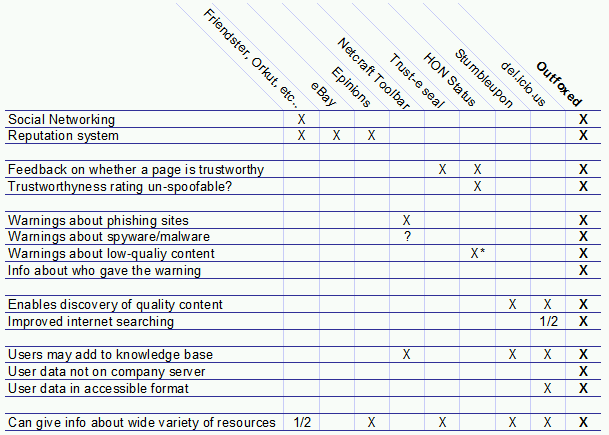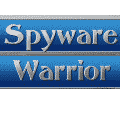Comparison to Existing Systems
This chart shows a feature by feature comparison of existing products related to online trust. (Clicking a column will jump to the corresponding comparison text.)

Reputation Systems
These systems are “closed-world,” in that they only provide and manage primarily within their own system. (Epinions is the exception in that it also gives trust information about products.) All of them use some sort of reputation system.
eBay
Uses a reputation system, based on feedback. Description is here
Friendster, Orkut
These systems require that trust always be mutual. No information is distributed over the social networks; they are only used for establishing social contacts.
Friendster’s system is desribed here. (Patent)
Tickle, LinkedIn
Primarily for finding business contacts.
Epinions
A very elegant web of trust system, where trusted reviewers rise to the top.
Safe/Enhanced Surfing Systems
These systems attempt, through various methods, to bring an element of trust to web surfing.
Stumbleupon
More for entertainment than safety, but it is still similar in that it gives users the ability to give evaluations of pages that they view. Pages are chosen for you based on an AI algorithm that compares your evaluations with those of other people, and tries to give you pages which were rated good by people similar to you. Outfoxed provies the same functionality via its "Random Page" option, and additionally can tell how you are connected to the person who gave the good review.
StumpleUpon also has the drawback that it's reccomendations cannot be completely trusted. It is a business trying to make money, and sells page views to companies willing to pay. (A problem similar to AOL's Weatherbug controversy.)
Netcraft Toolbar
A browser extension that allows users to report Phishing sites, and then alerts other users who attempt to access these sites. This is similar to Outfoxed, although all users are in one big pool. Users must trust Netcraft to filter out false or malicious reported data. It is worrisome that Netcraft has not ruled out the possibility of including advertising in the toolbar. Unlike Outfoxed (or Stumpleupon), this toolbar cannot share good pages. It also cannot report other sorts of dangerous pages (e.g. dialers, spyware), or simply bad pages. (e.g. too many advertisements, poorly organized data)
Trust-e
This company provides an image (they call it a "seal") that websites can display to prove that they are trustworthy. However, the presence of an image on a webpage gives absolutely no certainty for trust—copying an image is as easy as a right-click. Many spoofed pages prominently display the Trust-e seal, but are gone long before they can be tracked down, and long after innocent people's passwords and money are stolen. In this sense, Trust-e may actually be detrimental to online trust: if an internet user accepts the idea of an image guarunteeing trustworthiness, they especially vulnerable to these phishing attacks.
HON Status
A very nice extension which displays the trust status of pages visited by users. However, only trust regarding Medical sites is provided, and communication is always one way: The user simply receives the trust information, and cannot give their own evaluations of sites. In the Outfoxed model, HON would provide a statement which people could choose to trust or not.
Spoofsick
A browser extension that helps users to avoid spoofed sites by clearly indicating what site the user is actually on. This provides some measure of protection against phishing sites, but the display is visually annoying and users rarely use this product for long. This is merely a band-aid solution.
del.icio.us
A community bookmark system, where people can share and tag their bookmarks. You can get RSS feeds of other's bookmarks, but sadly you cannot chain these feeds as you can in Outfoxed. For example, subscribing to someone's feed does not also subscribe you to their feeds, etc... Outfoxed also adds the added benefit of incorporting the tags into search results, and uses tags for indicating areas in which an informer has special expertise. (Detailed examination in Tagging and Folksonomy)
Digg
Digg takes the idea of del.icio.us a bit further, by adding slashdot-style community editing of bookmarks. However, this method falls into the problem of trying to distil an absolute quality rating from the opinions of the masses. But as they say, there is no accounting for taste. Consider a politically-biased page: Half of the users will rate the page good ("digg it"), while half will rate it bad. The final verdict of the system will be that the page is halfway between good and bad.
Family Filtering
There exist many software products that filter pages for pornography and other objectionably material. This family of software is probably not replaceable by TrustBase, because of the shear volume of pornography on the internet, and because the people who would want such a filter are very unlikely to actively seek out and identify objectionable content.
Information-Only Systems
These sites provide trust information, but in traditional human-readable form that must be actively sought out. For example, see Clean Software, 419.


